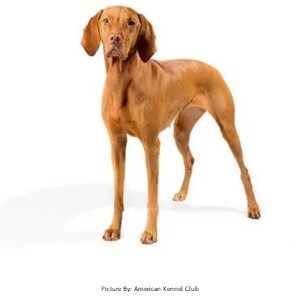Vizsla Dog Bed
Comfort Your Dog with an Orthopedic Bed!
Introduction
A Vizsla dog bed takes into account their sleeping style, health issues, and preferences. An orthopedic bed makes the best choice because of health conditions.
Vizslas are an ancient and noble breed, originally developed in Hungary as skilled hunting dogs. Renowned for their agility, intelligence, and affectionate nature, Vizslas are versatile companions, excelling both in the field and as beloved family pets. With their sleek, rust-colored coat and athletic build, they are easily recognizable and admired for their striking appearance.
Though medium-sized, Vizslas possess boundless energy and are known for their strong work ethic, making them ideal for active families or individuals who enjoy outdoor activities like running, hiking, or hunting.
As “Velcro dogs,” Vizslas are incredibly loyal and bond closely with their owners, often seeking out human companionship at every opportunity. This trait makes them excellent emotional support animals, though it also means they do not tolerate long periods of isolation well.
Their sensitive temperament and eagerness to please make them highly trainable, yet they require patient and consistent training, especially during their exuberant puppy years. Caring for a Vizsla requires a solid understanding of their unique needs, from proper exercise and mental stimulation to maintaining their health and addressing behavioral tendencies like separation anxiety.
For new or prospective owners, learning about the breed’s characteristics, health concerns, and care requirements is crucial for creating a happy and well-adjusted pet. Whether as loyal family members, capable hunting partners, or sporting companions, Vizslas bring energy, affection, and joy into the lives of those who are ready for the challenge.
In this guide we share information about the Vizsla dogs that potential new owners may not know about. The topics include best dog bed types, best brands, facts, fun facts, health issues, behavior concerns, tips for new owners, costs of ownership, and safe foods and foods to avoid.
Best Dog Bed Types & Brands
Here’s a list of dog bed types and recommended brands for Vizslas, keeping their active nature and need for comfort in mind:
Best Dog Bed Types for Vizslas
- Orthopedic Dog Beds: Ideal for supporting the joints and bones of Vizslas, especially as they age. When shopping for a memory foam orthopedic bed, be sure to look for the CertiPUR-US seal. The seal means that the materials used do not contain toxins or chemicals that are harmful to humans and pets.
- Memory Foam Beds: Provide excellent comfort and contouring support, which is great for active Vizslas who need recovery after exercise.
- Bolster Beds: These beds have raised sides that give Vizslas a sense of security, while the open space in the middle allows them to stretch out.
- Cooling Beds: Vizslas have short coats, and during hot weather, a cooling bed can help regulate their body temperature.
- Waterproof Beds: Durable and easy to clean, especially helpful for outdoor use or for dogs prone to accidents.
- Elevated/Cot-Style Beds: Raised beds provide airflow and are great for use outdoors or for dogs that get too warm sleeping on the ground.
Recommended Brands for Vizslas
- Big Barker – Known for orthopedic beds, perfect for large, active breeds like Vizslas.
- PetFusion – Offers memory foam beds with waterproof covers and headrests for extra comfort.
- Kuranda – Specializes in elevated beds that are durable and easy to clean, great for outdoor or cooling options.
- K9 Ballistics – Known for durable, chew-resistant beds that work well for active or rough dogs.
- FurHaven – Offers a variety of styles including orthopedic and cooling beds at a more affordable price.
- BarkBox – Popular for memory foam beds, often with added extras like blankets and toys, perfect for comfort and style.
These beds should accommodate the Vizsla’s high energy and need for comfort after their active days.
Video: Things Owners Know About Vizsla Dogs
This is an excellent video on the 10 things owners know about their Vizsla dogs.
Facts & Fun Facts
Here’s a list of facts and fun facts about Vizslas:
Measurements
- Height Male: 22 – 24 inches
- Height Female: 21 – 23 inches
- Weight Male: 55 – 60 lbs.
- Weight Female: 44 – 55 lbs.
- Length Male: 29 – 34 inches
- Length Female: 29 – 34 inches
- Lifespan: 12 – 14 years
- Fully Grown: 1.5 – 2 years old
- Color: Golden Rust
- Popularity: This dog breed is the 35th most popular in the United States according to the American Kennel Club.
- Intelligence: This breed is ranked the 25th most intelligent by Professor Stanley Coren at the University of British Columbia.
Facts about Vizslas
- Origin: Vizslas are a Hungarian breed that dates back to the 10th century, originally bred as hunting dogs for nobles.
- They’re the Ultimate Camouflage Dogs: Vizsalas are always golden rust-colored, with no variation in their coats. They have a similar brown eye color, which blends in with their coat. Their even brown tone makes them great at camouflaging, which comes in hands when hunting.
- Their Ancestors Were Falconers: The Vizsla’s ancestors are believed to be the dogs of the Magyar tribes who settled present day Hungry thousands of years ago. Archelogists have found stong etchings that depict the Magyar hunter with his falcon and his dog: the canine that would become the Vizsla.
- They’re Very Clean: When it comes to grooming, an occasional bath will keep their short coat looking great. However, their fast-growing nails need to be trimmed regularly.
- Purpose: They are versatile hunting dogs known for both pointing and retrieving game, making them exceptional field dogs.
- Coat: They have a sleek, short coat that is rust or golden-red in color, requiring minimal grooming.
- Temperament: Vizslas are affectionate, energetic, and highly intelligent, known for forming strong bonds with their families.
- Exercise Needs: These dogs are highly active and require plenty of daily exercise, including running, hiking, or vigorous play.
- Health: Common health concerns for Vizslas include hip dysplasia, epilepsy, and hypothyroidism.
- Trainability: They are highly trainable due to their intelligence and eagerness to please but can become bored with repetitive tasks.
- Social Dogs: Vizslas are known as “Velcro dogs” because they like to stay close to their humans and thrive on companionship.
Fun Facts about Vizslas
- “Velcro” Dogs: Vizslas earned their nickname because they love to stick close to their owners, often following them from room to room.
- Hungarian Nobility: The breed was favored by Hungarian royalty and aristocrats, who prized them for their hunting abilities.
- Almost Extinct: After World War I and World War II, Vizslas almost became extinct, but breed enthusiasts worked hard to revive their numbers.
- Sensitive Souls: Vizslas are highly sensitive to human emotions and often mirror their owner’s mood, making them excellent companions.
- Fast and Agile: Vizslas are incredibly fast runners, able to reach speeds of up to 40 mph, making them great competitors in dog sports like agility and field trials.
- Low Odor: Vizslas have a low odor compared to other breeds, which is one of the reasons they are popular as house pets.
- Excellent Swimmers: Many Vizslas love water and are strong swimmers, despite their sleek build and short coat.
- Energetic Puppies: Vizslas can be quite rambunctious and energetic as puppies, sometimes referred to as “little red tornadoes.”
- Famous Owners: Celebrities like Drew Barrymore and Courtney Cox have been known to own Vizslas.
- Olympian-Like Stamina: Vizslas can keep going for hours during physical activity, earning them a reputation for having nearly endless energy.
These traits make Vizslas both exciting companions and a unique breed to own.
Health Issues
Here’s a list of the most common health issues that affect Vizslas:
Common Health Issues in Vizslas
- Hip Dysplasia: This genetic condition causes improper formation of the hip joint, leading to arthritis and pain. It’s common in active breeds like Vizslas.
- Epilepsy: Vizslas are prone to idiopathic epilepsy, a neurological disorder that can cause seizures. It is often hereditary.
- Hypothyroidism: This condition occurs when the thyroid gland does not produce enough hormones, leading to weight gain, lethargy, and skin issues.
- Progressive Retinal Atrophy (PRA): A degenerative eye disorder that eventually leads to blindness. It typically appears later in life.
- Lymphosarcoma: Vizslas have a higher risk of developing this form of cancer, which affects the lymphatic system.
- Allergies: Vizslas can suffer from food or environmental allergies, leading to skin irritations, itching, and ear infections.
- Autoimmune Disorders: Vizslas are susceptible to certain autoimmune diseases such as autoimmune thyroiditis, where the immune system attacks the thyroid gland.
- Sebaceous Adenitis: This rare skin condition causes inflammation of the sebaceous glands, leading to hair loss, scaly skin, and secondary infections.
- Von Willebrand’s Disease: A blood clotting disorder that can lead to excessive bleeding during surgery or after injury.
- Gastric Dilatation-Volvulus (Bloat): This life-threatening condition can occur when a Vizsla’s stomach fills with gas and twists. Immediate veterinary care is required.
Regular checkups and early detection can help mitigate many of these issues. It’s important for Vizsla owners to be proactive about their dog’s health and stay informed on potential genetic concerns.
Behavior Concerns
Here’s a list of common behaviors that new Vizsla owners should be aware of:
Common Behaviors in Vizslas
- High Energy: Vizslas are extremely energetic and require lots of exercise. Without adequate physical activity, they can become restless and destructive.
- Separation Anxiety: Due to their strong attachment to their owners, Vizslas can suffer from separation anxiety if left alone for long periods. They thrive on human companionship.
- “Velcro Dog” Behavior: Vizslas are known to follow their owners everywhere, earning them the nickname “Velcro dogs.” They love being close to their family members at all times.
- Chewing: As puppies and even into adulthood, Vizslas may chew on objects, especially when bored. Providing appropriate chew toys and regular exercise helps curb this.
- Digging: Many Vizslas enjoy digging, which can become problematic in yards or gardens. This is often linked to boredom or excess energy.
- Sensitive Temperament: Vizslas are sensitive to tone of voice and harsh corrections. They respond best to positive reinforcement training methods.
- Barking: While not overly barky, some Vizslas may bark to alert their owners or when they are anxious or bored.
- Prey Drive: As a hunting breed, Vizslas have a strong prey drive and may chase small animals. They need training to manage this instinct, especially around other pets.
- Nudging and Leaning: Vizslas often nudge their owners with their nose or lean against them to seek attention or affection.
- Affectionate Nature: These dogs are very affectionate and love to cuddle, making them ideal for owners who enjoy close companionship with their pets.
Being aware of these behaviors can help new Vizsla owners provide the right environment, training, and care for their dogs.
Tips for New Owners
Here’s a list of tips that new Vizsla owners can use to ensure their dogs are happy, healthy, and well-behaved:
Tips for New Vizsla Owners
- Provide Plenty of Exercise: Vizslas are highly active dogs that need at least 1-2 hours of daily exercise. Activities like running, hiking, or playing fetch will help burn off their energy.
- Socialize Early: Expose your Vizsla to different people, pets, and environments when they are young to help them become well-adjusted, confident adults.
- Use Positive Reinforcement: Vizslas respond well to praise, treats, and positive reinforcement. Avoid harsh corrections, as they are sensitive and can become anxious.
- Mental Stimulation is Key: Vizslas are intelligent dogs and need mental challenges to stay happy. Puzzle toys, obedience training, and scent games are great ways to keep them engaged.
- Don’t Leave Them Alone for Long Periods: Vizslas are prone to separation anxiety, so avoid leaving them alone for extended periods. If necessary, consider dog daycare or a dog walker.
- Crate Training: Start crate training early to give your Vizsla a safe space to relax when you’re away and to prevent destructive behavior.
- Regular Grooming: Though their coat is short, Vizslas benefit from regular brushing to keep their skin healthy and reduce shedding.
- Invest in Durable Chew Toys: Vizslas love to chew, so have durable toys on hand to prevent them from chewing on household items.
- Train Consistently: Be consistent with commands and training from an early age. This will help set boundaries and ensure your Vizsla listens well as they grow.
- Provide a Comfortable Sleeping Space: Given their need for companionship, place their bed in a room where they can be close to family members. Orthopedic or memory foam beds are ideal for supporting their active bodies.
These tips will help new owners set their Vizslas up for success and create a strong, loving bond.
Costs of Ownership
Here’s a breakdown of the average costs of owning a Vizsla that new dog owners can budget for:
Average Costs of Vizsla Ownership
- Initial Purchase Price:
- From a reputable breeder: $1,000 – $2,500
- Adoption fee (if from a rescue): $200 – $500
- Medical Costs:
- Initial Vet Visits: $100 – $300 (for vaccinations, checkups, microchipping)
- Spaying/Neutering: $200 – $500
- Annual Vet Visits: $200 – $400 (general checkups, vaccinations, flea/tick preventatives)
- Pet Insurance: $30 – $60 per month (depending on coverage)
- Emergency Care: $500 – $3,000 (in case of accidents or health issues)
- Food:
- High-quality dog food: $40 – $70 per month
- Treats and supplements: $10 – $30 per month
- Training:
- Puppy training classes: $100 – $300 (for a set of classes)
- Private training: $30 – $80 per session (depending on location and trainer)
- Grooming:
- Grooming supplies (brush, shampoo, nail clippers): $50 – $100 (one-time cost)
- Occasional professional grooming: $40 – $70 per session (for bathing and nail trimming)
- Toys & Accessories:
- Durable toys: $10 – $50 per month (as Vizslas are active and may go through toys quickly)
- Leashes, collars, and harnesses: $20 – $50 (initial cost)
- Bedding: $50 – $150 (one-time or occasional replacement)
- Boarding/Dog Walking:
- Boarding (when away on vacation): $30 – $60 per day
- Dog walking services: $15 – $30 per walk (if needed regularly)
- Licensing and Miscellaneous:
- Dog license: $10 – $30 annually (depending on local regulations)
- Miscellaneous (flea/tick treatment, supplements, etc.): $100 – $300 annually
Estimated Annual Cost:
- First Year: $2,000 – $4,000 (due to initial purchases like the dog, medical expenses, and training)
- Following Years: $1,200 – $2,500 (depending on vet visits, food, and other recurring expenses)
Owning a Vizsla comes with both upfront and ongoing costs, but with proper care, they can lead a healthy, active life.
Safe Foods & Foods to Avoid
Here’s a list of safe and unsafe foods for Vizslas:
Safe Foods for Vizslas
- Lean Meats: Chicken, turkey, beef, and lamb (cooked and unseasoned).
- Fish: Salmon, sardines, and other oily fish (cooked and boneless) for healthy omega-3 fatty acids.
- Carrots: A great low-calorie snack that’s also good for dental health.
- Sweet Potatoes: Rich in vitamins and fiber, safe when cooked and unseasoned.
- Blueberries: Full of antioxidants and fiber, these make excellent treats.
- Apples: A good source of vitamins A and C, but be sure to remove seeds and core.
- Pumpkin: Helps with digestion and can soothe upset stomachs (cooked and plain).
- Green Beans: Low in calories and a good source of fiber, great for weight management.
- Rice: Cooked plain rice is easily digestible and can help with upset stomachs.
- Peanut Butter: In moderation, unsalted and xylitol-free peanut butter is a tasty treat.
Foods to Avoid for Vizslas
- Chocolate: Toxic due to theobromine, can cause vomiting, seizures, and even death.
- Grapes and Raisins: Can cause kidney failure in dogs, even in small amounts.
- Onions and Garlic: Contain compounds that can cause anemia by damaging red blood cells.
- Avocados: Contains persin, which is toxic to dogs and can cause vomiting and diarrhea.
- Alcohol: Even small amounts can lead to alcohol poisoning in dogs.
- Xylitol (Artificial Sweeteners): Found in sugar-free gum and some peanut butters, can cause dangerously low blood sugar and liver damage.
- Macadamia Nuts: Toxic to dogs, causing weakness, vomiting, and tremors.
- Cooked Bones: They can splinter and cause choking or digestive tract injuries.
- Caffeine: Found in coffee, tea, and certain sodas, it’s toxic to dogs and can cause hyperactivity, tremors, and seizures.
- Raw Dough: The yeast in uncooked dough can cause stomach bloat and alcohol poisoning.
These guidelines help ensure that your Vizsla enjoys safe and nutritious food choices.
Conclusion
Owning a Vizsla is a rewarding experience, but it comes with its own set of responsibilities. As one of the most active and affectionate breeds, Vizslas thrive on human interaction and physical activity.
Their strong bond with their owners, coupled with their need for both mental and physical engagement, means they are not well-suited for sedentary households or those who are frequently away from home. Instead, Vizslas need environments where they can be a part of daily activities, whether that involves outdoor adventures, playtime, or simply lounging around with family members.
Understanding the health concerns that come with owning a Vizsla, such as hip dysplasia, epilepsy, and hypothyroidism, allows for better preventive care and early intervention. Regular veterinary checkups, high-quality nutrition, and ensuring your Vizsla gets enough exercise are key to keeping them healthy and happy.
Behaviorally, knowing how to handle issues like separation anxiety, chewing, and their strong prey drive will help owners foster a well-balanced dog. Training is essential, but with their intelligence and eagerness to please, Vizslas typically respond well to positive reinforcement.
For those who lead an active lifestyle and seek a devoted, high-energy companion, the Vizsla is an ideal breed. Their versatility, whether in sports, hunting, or simply as a loyal pet, sets them apart as a unique and cherished breed.
With the right care, attention, and love, Vizslas can thrive and bring immense joy and companionship to their owners, proving themselves to be a remarkable addition to any family.
You can read about our other dog breed information articles by clicking HERE!
Shop Dog Beds
You can shop for a dog bed by selecting a bed of interest. You will be taken to Amazon where you can place the order. While there, you can read the customer reviews and answered questions before purchasing.
As an Amazon Associate, I earn from qualifying purchases. Your purchase price is the same as if you shop directly on Amazon.
The price at time of publish is included below to give you an idea of what the price is; however, it is subject to change.
Shop Rectangle Dog Beds
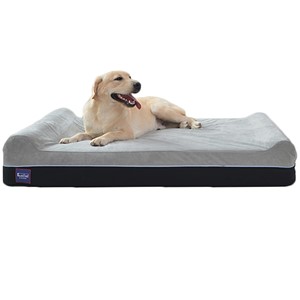
Laifug Large Grey Orthopedic Rectangle Bed
Price At Time of Publish $130.00
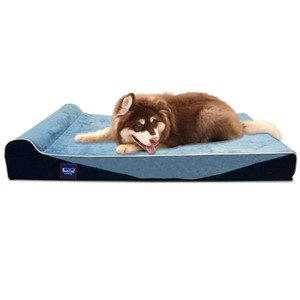
Laifug Large Blue Orthopedic Rectangle Bed
Price At Time of Publish $130.00 $110.00
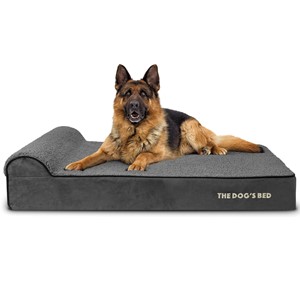
The Dogs Bed XL Grey Orthopedic Rectangle Bed
Price At Time of Publish $130.00 $185.00
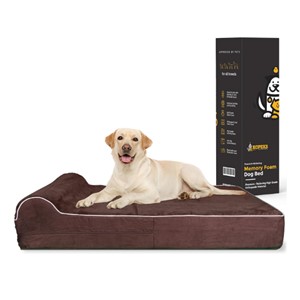
KOPEKS Jumbo Orthopedic Rectangular Bed
Price At Time of Publish $130.00 $110.00
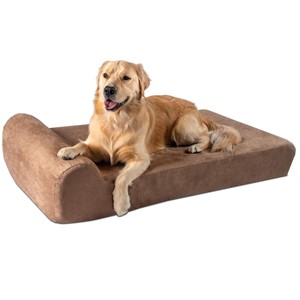
Big Barker XL Orthopedic Rectangle Bed
Price At Time of Publish $130.00 $240.00
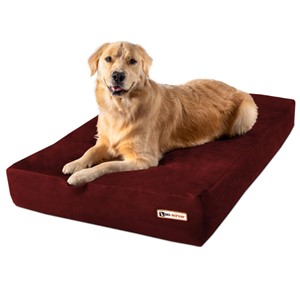
Big Barker XL Burgundy Orthopedic Rectangle Bed
Price At Time of Publish $130.00 $200.00
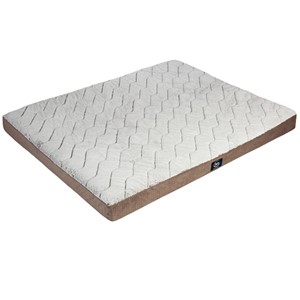
Serta XL Brown Orthopedic Rectangle Bed
Price At Time of Publish $130.00 $80.00
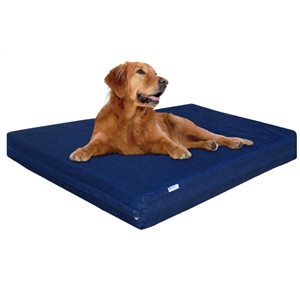
DogBed4Less XL Blue Orthopedic Rectangle Bed
Price At Time of Publish $130.00 $80.00
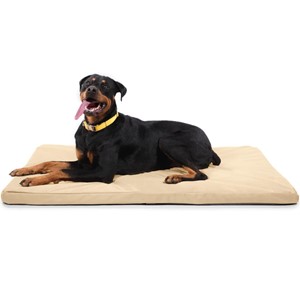
K9 Ballistics XL Sandstone Orthopedic Crate Pad
Price At Time of Publish $130.00 $159.00
Shop Bolster Dog Beds
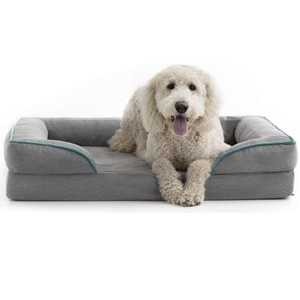
Brindle XL Gray Orthopedic Bolster Bed
Price At Time of Publish $130.00 $79.00
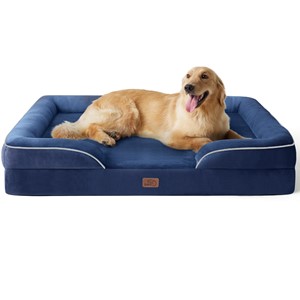
Bedsure XL Blue Orthopedic Bolster Bed
Price At Time of Publish $130.00 $76.00
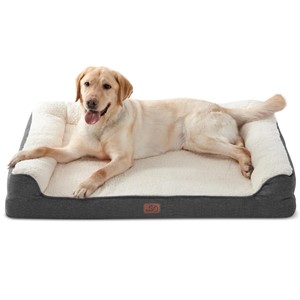
Bedsure XL Grey Orthopedic Bolster Bed
Price At Time of Publish $130.00 $60.00
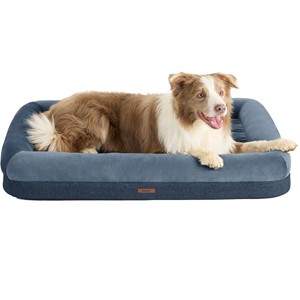
Lesure XL Navy Orthopedic Bolster Bed
Price At Time of Publish $130.00 $40.00
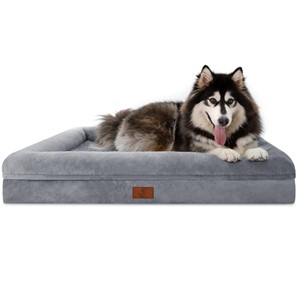
Yiruka XL Grey Orthopedic Bolster Bed
Price At Time of Publish $130.00 $55.00
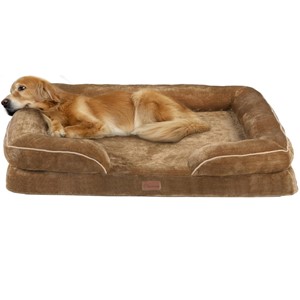
Yitahome XL Brown Orthopedic Bolster Bed
Price At Time of Publish $130.00 $37.00
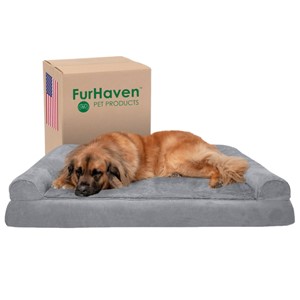
Furhaven XL Gray Orthopedic Bolster Bed
Price At Time of Publish $130.00 $130.00
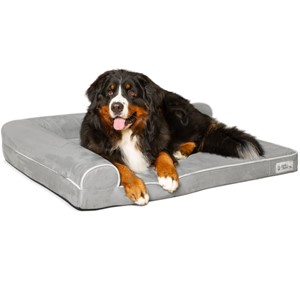
PetFusion XL Grey Orthopedic Bolster Bed
Price At Time of Publish $130.00 $60.00
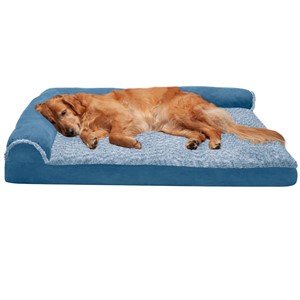
Furhaven Jumbo Blue Orthopedic Bolster Bed
Price At Time of Publish $130.00 $60.00
Shop Elevated Dog Beds
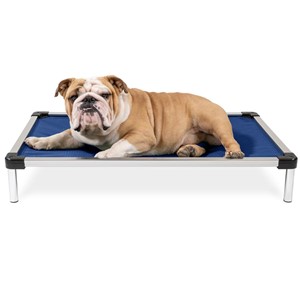
K9 Ballistics Chew Proof Elevated Small Bed
Price At Time of Publish $130.00 $129.00
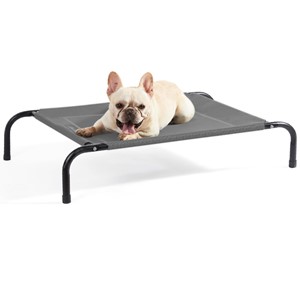
Bedsure Medium Elevated Dog Bed
Price At Time of Publish $130.00 $33.00
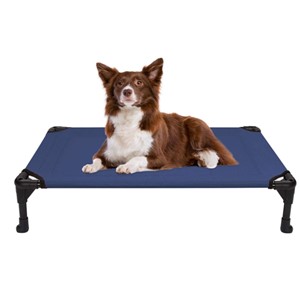
Veehoo Medium Elevated Dog Bed
Price At Time of Publish $130.00 $45.00
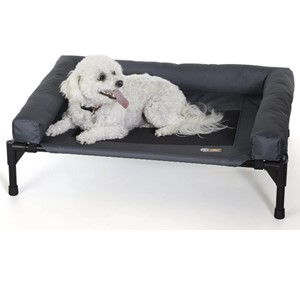
K&H Pet Products Elevated Bolster Dog Bed
Price At Time of Publish $130.00 $57.00
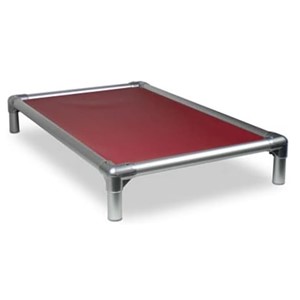
Kuranda Elevated Chew Proof Small Dog Bed
Price At Time of Publish $130.00 $134.00
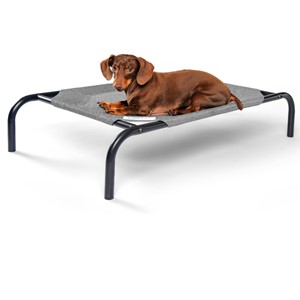
Coolaroo Small Elevated Dog Bed
Price At Time of Publish $130.00 $21.00
Related Articles
Below are some other articles that might interest you. Just select one that you want to learn more about.
- Best Dog Training Toys
- Best Healthy Dog Food Brands
- Dog Training Techniques
- Feeding Dogs Different Life Stages
- How To Train A Puppy
- Positive Reinforcement for Dog Training
- Puppy Proofing Your House
- Using Alexa for Dog Behaviors
Go back to the Dog Luxury Beds home page.
